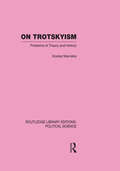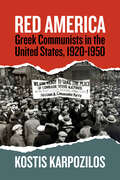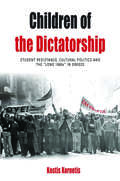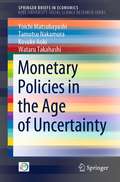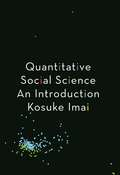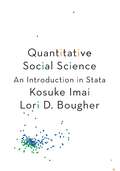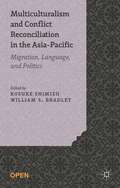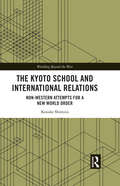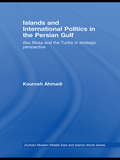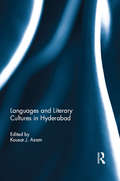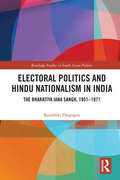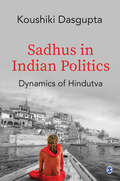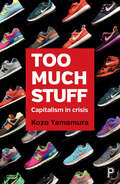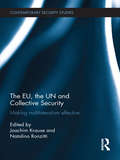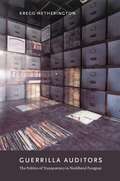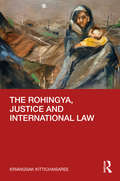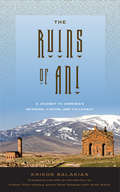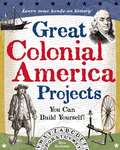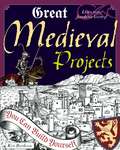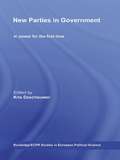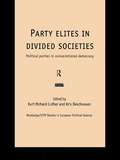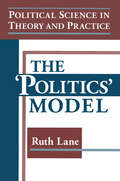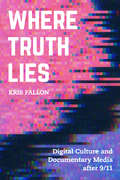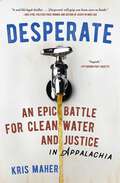- Table View
- List View
On Trotskyism (Routledge Library Editions: Political Science #58)
by Kostas MavrakisTrotsky--brilliant publicist, enthusiastic speaker, organizer of the Red Army, eminent member of the Bolshevik Party during the first years of the Russian Revolution--has often been depicted as a romantic figure by biographers. Kostas Mavrakis does not see him in this light. Mavrakis submits Trotsky, his thought and work to a severe but fair critical examination. Among the issues reassessed by this controversial scholar are Trotsky's incapacity for concrete analysis, the 'economism' he shares with Stalin, his concepts of 'permanent revoluation' as compared with those of Lenin and Mao, his views and those of Stalin, on the Chinese Revolution, the fundamental traits of Trotskyism and of the different trotskyist organizations.
Greeks and Barbarians
by Kostas VlassopoulosThis book is an ambitious synthesis of the social, economic, political and cultural interactions between Greeks and non-Greeks in the Mediterranean world during the Archaic, Classical and Hellenistic periods. Instead of traditional and static distinctions between Greeks and Others, Professor Vlassopoulos explores the diversity of interactions between Greeks and non-Greeks in four parallel but interconnected worlds: the world of networks, the world of apoikiai ('colonies'), the Panhellenic world and the world of empires. These diverse interactions set into motion processes of globalisation; but the emergence of a shared material and cultural koine across the Mediterranean was accompanied by the diverse ways in which Greek and non-Greek cultures adopted and adapted elements of this global koine. The book explores the paradoxical role of Greek culture in the processes of ancient globalisation, as well as the peculiar way in which Greek culture was shaped by its interaction with non-Greek cultures.
Red America: Greek Communists in the United States, 1920-1950
by Kostis KarpozilosHistorians of immigration and ethnicity in the United States have typically devoted little attention to Greek Americans, while popular narratives depict them as indifferent or hostile to political and social radicalism. From acclaimed historian Kostis Karpozilos, Red America provides an alternative narrative of the Greek American experience. Focusing on the history of the Greek American Left from the beginning of the twentieth century to the Cold War, this volume uncovers the threads that bound notions of radical social change to everyday immigrant life, tracing ethnic radicalism from the boundaries of a specific community to the epicenter of American social and political history.
Children of the Dictatorship
by Kostis KornetisPutting Greece back on the cultural and political map of the "Long 1960s," this book traces the dissent and activism of anti-regime students during the dictatorship of the Colonels (1967-74). It explores the cultural as well as ideological protest of Greek student activists, illustrating how these "children of the dictatorship" managed to re-appropriate indigenous folk tradition for their "progressive" purposes and how their transnational exchange molded a particular local protest culture. It examines how the students' social and political practices became a major source of pressure on the Colonels' regime, finding its apogee in the three day Polytechnic uprising of November 1973 which laid the foundations for a total reshaping of Greek political culture in the following decades.
Monetary Policies in the Age of Uncertainty (SpringerBriefs in Economics)
by Tamotsu Nakamura Yoichi Matsubayashi Kosuke Aoki Wataru TakahashiThis book provides an interesting review of Japanese monetary policies after the bubble economy. The Bank of Japan was the first central bank in advanced economies to implement the unconventional monetary policies during the period. After the Lehman shock, most advanced economies also carried out similar monetary policies to boost their own economies. The Japanese experience in the 1990s and 2000s no doubt played a key role during the period. Although various aspects of the experiences have been examined, not many books have been published based on intensive discussions between the macro and monetary theorists who have been active in academics and the practitioners who have actually been involved in monetary policy. This small but important book has focused on the Japanese experience. Evaluation of that experience found that three solid pillars are of crucial importance: theory, institution, and experience. Those form the basis of the book, without theory, no policies will be formulated and implemented, and implementation depends crucially on institution. Chapter 1 provides a clear theoretical background for the unconventional monetary policies and inflation targeting. Chapter 2 intensively explores the meaning and desirability of the independence of central banks. Chapter 3 reviews the consequences of the Japanese monetary policies in recent decades in comparison with those in other advanced economies.
Quantitative Social Science: An Introduction
by Kosuke ImaiAn introductory textbook on data analysis and statistics written especially for students in the social sciences and allied fieldsQuantitative analysis is an increasingly essential skill for social science research, yet students in the social sciences and related areas typically receive little training in it—or if they do, they usually end up in statistics classes that offer few insights into their field. This textbook is a practical introduction to data analysis and statistics written especially for undergraduates and beginning graduate students in the social sciences and allied fields, such as economics, sociology, public policy, and data science.Quantitative Social Science engages directly with empirical analysis, showing students how to analyze data using the R programming language and to interpret the results—it encourages hands-on learning, not paper-and-pencil statistics. More than forty data sets taken directly from leading quantitative social science research illustrate how data analysis can be used to answer important questions about society and human behavior.Proven in the classroom, this one-of-a-kind textbook features numerous additional data analysis exercises and interactive R programming exercises, and also comes with supplementary teaching materials for instructors.Written especially for students in the social sciences and allied fields, including economics, sociology, public policy, and data scienceProvides hands-on instruction using R programming, not paper-and-pencil statisticsIncludes more than forty data sets from actual research for students to test their skills onCovers data analysis concepts such as causality, measurement, and prediction, as well as probability and statistical toolsFeatures a wealth of supplementary exercises, including additional data analysis exercises and interactive programming exercisesOffers a solid foundation for further studyComes with additional course materials online, including notes, sample code, exercises and problem sets with solutions, and lecture slidesLooking for a more accessible introduction? Consider Data Analysis for Social Science by Elena Llaudet and Kosuke Imai, which teaches from scratch and step-by-step the fundamentals of survey research, predictive models, and causal inference. It covers descriptive statistics, the difference-in-means estimator, simple linear regression, and multiple linear regression.
Quantitative Social Science: An Introduction in Stata
by Kosuke Imai Lori D. BougherThe Stata edition of the groundbreaking textbook on data analysis and statistics for the social sciences and allied fieldsQuantitative analysis is an increasingly essential skill for social science research, yet students in the social sciences and related areas typically receive little training in it—or if they do, they usually end up in statistics classes that offer few insights into their field. This textbook is a practical introduction to data analysis and statistics written especially for undergraduates and beginning graduate students in the social sciences and allied fields, such as business, economics, education, political science, psychology, sociology, public policy, and data science.Quantitative Social Science engages directly with empirical analysis, showing students how to analyze data using the Stata statistical software and interpret the results—it emphasizes hands-on learning, not paper-and-pencil statistics. More than fifty data sets taken directly from leading quantitative social science research illustrate how data analysis can be used to answer important questions about society and human behavior.Proven in classrooms around the world, this one-of-a-kind textbook features numerous additional data analysis exercises, and also comes with supplementary teaching materials for instructors.Written especially for students in the social sciences and allied fields, including business, economics, education, psychology, political science, sociology, public policy, and data scienceProvides hands-on instruction using Stata, not paper-and-pencil statisticsIncludes more than fifty data sets from actual research for students to test their skills onCovers data analysis concepts such as causality, measurement, and prediction, as well as probability and statistical toolsFeatures a wealth of supplementary exercises, including additional data analysis exercises and interactive programming exercisesOffers a solid foundation for further studyComes with additional course materials online, including notes, sample code, exercises and problem sets with solutions, and lecture slides
Multiculturalism and Conflict Reconciliation in the Asia-Pacific: Migration, Language And Politics
by Kosuke Shimizu William S. BradleyMulticulturalism and Conflict Reconciliation in the Asia-Pacific: Migration, Language and Politics
The Kyoto School and International Relations: Non-Western Attempts for a New World Order (Worlding Beyond the West)
by Kosuke ShimizuThe Kyoto School and International Relations explores the Kyoto School’s challenge to transcend the ‘Western’ domination over the ‘rest’ of the world, and the issues this raises for contemporary ‘non-Western’ and ‘Global IR’ literature. Was the support of Kyoto School thinkers inevitable due to the despotism of military government, thus nothing to do with their philosophy, or a logical extension of their philosophical engagement? The book answers this question by investigating individual Kyoto School philosophers in detail. The author argues that any attempts to transcend the ‘West’ are destined to be drawn into power politics as far as they uncritically adopt and use the prevailing ontological concept of linear progressive time and dominant meta-narrative of Westphalia. Thus, to fully understand this problem, there is the need to be cautious of the power of language of Westphalia and the concept of time in IR. Aimed at students and scholars of IR theory, Japanese politics and East Asian IR in general, this book provides some introductory explanations of these academic subjects, developing a theory based on the concepts of time and language of Kyoto School philosophy.
Islands and International Politics in the Persian Gulf: The Abu Musa and Tunbs in Strategic Context (Durham Modern Middle East and Islamic World Series)
by Kourosh AhmadiThe position of the Persian Gulf as the main highway between East and West has long given this region special significance both within the Middle East and in global affairs more generally. This book examines the history of international relations in the Gulf since the 1820s as great powers such as Britain and the US, and regional powers such as Iran and Iraq, vied for supremacy over this geopolitically vital region. It focuses on the struggle for control over the islands of the Gulf, in particular the three islands of Abu Musa, Greater Tunb and Lesser Tunb – an issue that remains highly contentious today. It describes how for 170 years Britain eroded Iranian influence in the Gulf, both directly by asserting colonial rule over Iranian islands and port districts, and also through claiming Iranian islands for their protégés on the Arab littoral. It shows how, after Britain's withdrawal, these islands became a pawn in the animosity and conflict that pitted, at one time, Arab radicals and nationalists against monarchical Iran, and, later, the conservative-moderate Arab camp against Islamic Iran. It goes on to explore the impact of the rise of American power in the Gulf since the start of the 1990s, its policy of containment of Iran and Iraq, and how this has provided encouragement to the ambitions of the Persian Gulf Arab littoral states, especially the UAE, towards the islands of the Gulf.
Languages and Literary Cultures in Hyderabad
by Kousar J. AzamThere is great interest in recent scholarship in the study of metropolitan cultures in India as evident from the number of books that have appeared on cities such as Delhi, Mumbai, Chennai and Kolkata. Though Hyderabad has a rich archive of history scattered in many languages, very few attempts have been made to bring this scholarship together. The papers in this volume bring together this scholarship at one place. They trace the contribution of different languages and literary cultures to the multicultural mosaic that is the city of Hyderabad How it has acquired this uniqueness and how it has been sustained is the subject matter of literary cultures in Hyderabad. This work attempts to trace some aspects of the history of major languages practiced in the city. It also reviews the contribution of the various linguistic groups that have added to the development not just of varied literary cultures, but also to the evolution of an inclusive Hyderabadi culture. The present volume, it is hoped, will enthuse both younger and senior scholars and students to take a fresh look at the study of languages and literary cultures as they have evolved in India's cities and add to the growing scholarship of metropolitan cultures in India.
Electoral Politics and Hindu Nationalism in India: The Bharatiya Jana Sangh, 1951–1971 (Routledge Studies in South Asian Politics)
by Koushiki DasguptaThis book analyses the rise and growth of the Hindu nationalist party Bharatiya Jana Sangh in post independent India, tracking the electoral journey of the party from 1951 to 1971. Offering a comprehensive analysis of the party Bharatiya Jana Sangh - its origin, ideas and electoral performances in the first two decades of its journey - the book provides an overview of the state-wise electoral record of the party mobilizing Hindu support and managing factional disputes. It surveys the issues of conflicts between the intraparty factions dominated by the recruits from the Rastriya Swayamseyak Sangh and the others. The author also presents a critique of the Hindutva politics of the Bharatiya Jana Sangh on account of its somewhat imperfect appeal among the masses and its problems in raising real issues of socio-economic concern. With a special emphasis on the states situated outside the Hindi language belt of Northern India, the electoral outcome of the Jana Sangh during each national and state legislative elections are analysed. Based on the dialectics of ideology and exigency, this book makes a thorough investigation of the leadership-succession crises in the party, patterns of vote sharing at the regional level and trends of coalition with the non-Congress parties in the states. Providing a nuanced understanding of the processes leading to the strengthening of right-wing political parties in India, the book will be of interest to academics working in the fields of nationalism, party politics and South Asian Politics.
Sadhus in Indian Politics: Dynamics of Hindutva
by Koushiki DasguptaSadhus in Indian Politics: Dynamics of Hindutva maps the changing face of contemporary Hindu politics, evaluating the influence of sadhus (ascetics) on the course of politics in India. This book explores the anxieties around ascetic engagement with public affairs, understanding politics as janaseva and polities as rajniti, and the authority exercised by these sadhus. It investigates the spirit of ‘individualism’ reflected by the sadhus in the organized and unorganized domains of politics, and traces the dialectics of ‘Hindutva’ reflected through selected case studies, exposing the patterns of how the sadhus got involved in the muddled world of politics. This book also demonstrates the uneasy conflict between the modern Hindu right wing and Hindu traditionalists with their advocacy of Sanatan Dharma. It turns towards sadhus and gurus to explore the ‘Hindu-ness’ of the Hindus and confronts the metanarrative of Hindutva offered by various institutions.
Too Much Stuff: Capitalism in Crisis
by Kozo YamamuraWhere has capitalism gone wrong? Why are advanced capitalist economies so sick and why do conventional policy solutions, such as reduced taxes and increased money supply, produce only wider income disparity and inequality? We now live in a new world in which we enjoy the highest living standard in history, acquiring ever more goods and services as necessary luxuries. Yet current policies only serve to expand public debt and exacerbate socio-economic inequality. In Too much stuff, Yamamura upends conventional capitalist wisdom to provide a new approach. He suggests the only way for capitalism and democracy to thrive is to increase investment to meet societal needs such as improving social safety nets, infrastructure, and better education and health care for all, but this means raising taxes. Both solutions-orientated and accessibly written, this book argues that this will help reduce the growing wealth gap which threatens global democracy. With fascinating examples from the US, Japan and Germany, as well as convincing evidence from across the Western world, this bold book challenges the economic orthodoxy and offers practical steps forward that we can all support.
The EU, the UN and Collective Security: Making Multilateralism Effective (Contemporary Security Studies)
by Krause Joachim Ronzitti NatalinoThis book examines the effectiveness of multilateralism in ensuring collective security and, in particular, the EU’s role in this process. In 1992, shortly after the end of the Cold War, a Security Council Summit in New York reaffirmed the salience of the system of collective security and stated the determination of the Heads of State to maintain it as the prime international instrument for preserving peace. Twenty years later, however, the record of collective security as well as of multilateralism has not been very encouraging. The system of collective security, as enshrined in the United Nations (UN) Charter, failed repeatedly to accomplish its mandate in the 1990s and has led to controversial debates in the United States and Europe that reached a climax during the Iraq crisis in 2002/03. The volume draws upon both theoretical and empirical research to answer the following core questions: What are the reasons that have made multilateralism either effective or ineffective in the field of peacekeeping, peace preservation and peacebuilding? How can multilateralism be made more effective? How can attempts made by Europe to render UN multilateralism in the security area more efficient be assessed? This book will be of much interest to students of peacebuilding/peacekeeping, EU policy, the UN, security studies and IR in general.
Guerrilla Auditors: The Politics of Transparency in Neoliberal Paraguay
by Kregg HetheringtonGuerrilla Auditors is an ethnographic account of the rise of information, transparency, and good governance in the post-Cold War era, and the effects of these concepts on Paraguay's transition to democracy. Kregg Hetherington shows that the ideal of transparent information, meant to depoliticize bureaucratic procedures, has become a battleground for a new kind of politics centered on legal interpretation and the manipulation of official documents. In late-twentieth-century Paraguay, peasant land politics moved unexpectedly from the roads and fields into the documentary recesses of state bureaucracy. When peasants, bureaucrats, and development experts encountered one another in state archives, conflicts ensued about how bureaucracy ought to function, what documents are for, and who gets to narrate the past and the future of the nation. Hetherington argues that Paraguay's neoliberal democracy is predicated, at least in part, on an exclusionary distinction between model citizens and peasants. Despite this, peasant activists have found ways to circumvent their exclusion and in so doing question the conceptual foundations of international development orthodoxy.
The Rohingya, Justice and International Law
by Kriangsak KittichaisareeWritten by an international judge, professor and former ambassador with decades of experience in the field, this is an incisive and highly readable book about international law as well as realpolitik in bilateral and multilateral diplomacy in the quest for justice by victims of serious human rights violations amounting to grave crimes of international concern. Focusing on the plight of the ethnic and religious group of persons called the ‘Rohingya’, normally residing in Myanmar, as the case study, the book elaborates the complex legal technicalities and impediments in international courts and foreign domestic criminal courts exercising ‘universal jurisdiction’ in relation to acts amounting to genocide, crimes against humanity and/or war crimes. It builds on and adds value to existing literature on the international law applicable to the protection of human rights as interpreted by the International Court of Justice as well as that on the international criminal justice meted out by domestic criminal courts, ad hoc international criminal tribunals and the permanent International Criminal Court. The book will be essential reading for students, researchers and academics in public international law, international criminal law, international human rights law as well as government officials and those working for NGOs and international organizations with mandates in these fields.
The Ruins of Ani: A Journey to Armenia's Medieval Capital and its Legacy
by Peter Balakian Krikor BalakianFrom the tenth to the thirteenth centuries, the city of Ani was the jewel of the Armenian kingdom, renowned far and wide for its magnificent buildings. Known as the city of 1001 churches, Ani was a center for artistic innovation, and its architecture is a potential missing link between Byzantine and Gothic styles. By the fifteenth century, Ani was virtually abandoned, its stunning buildings left to crumble. Yet its ruins have remained a symbol of cultural accomplishment that looms large in the Armenian imagination. The Ruins of Ani is a unique combination of history, art criticism, and travel memoir that takes readers on a thousand-year journey in search of past splendors. Today, Ani is a popular tourist site in Turkey, but the city has been falsified in its presentation by the Turkish government in order to erase Armenian history in the wake of the Armenian Genocide. This timely publication also raises questions about the preservation of major historic monuments in the face of post atrocity campaigns of cultural erasure. Originally written by young priest Krikor Balakian in 1910, just a few years before the Armenian genocide, this book offers a powerful and poignant counterpart to Balakian’s acclaimed genocide memoir Armenian Golgotha. This new translation by the author’s great-nephew, Pulitzer Prize-winning poet Peter Balakian, eloquently renders the book’s vivid descriptions and lyrical prose into English. Including a new introduction that explores Ani’s continued relevance in the twenty-first century, The Ruins of Ani will give readers a new appreciation for this lost city’s status as a pinnacle of both Armenian civilization and human achievement.
Great Colonial America Projects
by Kris BordessaGreat Colonial America Projects You Can Build Yourself introduces readers ages 9-12 to colonial America through hands-on building projects. From dyeing and spinning yarn to weaving cloth, from creating tin plates and lanterns to learning wattle and daub construction. Great Colonial America Projects You Can Build Yourself gives readers a chance to experience how colonial Americans lived, cooked, entertained themselves, and interacted with their neighbors.
Great Medieval Projects
by Shawn Braley Kris BordessaGreat Medieval Projects You Can Build Yourself brings the Middle Ages in Europe alive through hands-on activities for kids ages 9-12. Addressing various aspects of medieval life, this book provides historically accurate details of the period leading up to the Renaissance. From monastic life to castle living, villages to towns, each section offers a glimpse into the daily existence of the people who lived in medieval Europe. Sidebars and fun trivia break up the text. Readers will expand their knowledge of this era beyond knights, fair maidens, and castles as they learn about siege warfare, life in a medieval village, medieval clothing, markets and fairs, the Plague, medieval medicine, and the Crusades.
New Parties in Government: In Power for the First Time (Routledge/ECPR Studies in European Political Science)
by Kris DeschouwerParty literature is largely focused on the rise and success of new parties and their effects on party systems and older parties. This book, on the other hand, provides a valuable and original addition to such literature by analyzing what happens to a party when it enters government for the first time. Leading contributors assess how these parties, whether old or new, change when entering government by answering a set of questions: How and why has their role changed? What are the consequences of change? What explains the evolution from principled opposition to loyal opposition and eventually to participation in the executive? Which characteristics of the parties can be held responsible? Which characteristics of the parties’ context should be brought into the picture? What have been the effects of the status change on party organization, party ideology and electoral results? Covering a wide range of European parties such as the Finish Greens, right wing parties (FN, Lega Nord and Alleanza Nazionale) and new parties in Italy , The Netherlands and Sweden to name a few; this book will be of particular interest to scholars and students concerned with party systems, political parties and comparative politics.
Party Elites in Divided Societies: Political Parties in Consociational Democracy (Routledge/ECPR Studies in European Political Science)
by Kris Deschouwer Kurt Richard LutherWorking from the basis of Arend Lijphart's 1968 work on divided societies, the authors go on to look at such cultures and subcultures thirty years on, bringing in new evidence and analysis to bear on the issue. They also examine the essential role of party politics within and between these ^D", framing comparisons with a number of countries from Belgium to Israel.
Political Science in Theory and Practice: The Politics Model
by Kris E LaneThis text demonstrates that there is a politics model that unifies the discipline and structures its relationship to the other social sciences. It shows how this model underlies important works of applied research in all the main political science subfields.
Where Truth Lies: Digital Culture and Documentary Media after 9/11
by Kris FallonA free open access ebook is available upon publication. Learn more at www.luminosoa.org. This boldly original book traces the evolution of documentary film and photography as they migrated onto digital platforms during the first decades of the twenty-first century. Kris Fallon examines the emergence of several key media forms—social networking and crowdsourcing, video games and virtual environments, big data and data visualization—and demonstrates the formative influence of political conflict and the documentary film tradition on their evolution and cultural integration. Focusing on particular moments of political rupture, Fallon argues that the ideological rifts of the period inspired the adoption and adaptation of newly available technologies to encourage social mobilization and political action, a function performed for much of the previous century by independent documentary film. Positioning documentary film and digital media side by side in the political sphere, Fallon asserts that "truth" now lies in a new set of media forms and discursive practices that implicitly shape the documentation of everything from widespread cultural spectacles like wars and presidential elections to more invisible or isolated phenomena like the Abu Ghraib torture scandal or the "fake news" debates of 2016.
Desperate: An Epic Battle for Clean Water and Justice in Appalachia
by Kris MaherSet in Appalachian coal country, this &“superb&” (Pittsburgh Post-Gazette) legal drama follows one determined lawyer as he faces a coal industry giant in a seven-year battle over clean drinking water for a West Virginia community.For two decades, the water in the taps and wells of Mingo County didn&’t look, smell, or taste right. Could the water be the root of the health problems—from kidney stones to cancer—in this Appalachian community? Environmental lawyer Kevin Thompson certainly thought so. For seven years, Thompson waged an epic legal battle against Massey Energy, West Virginia&’s most powerful coal company, helmed by CEO Don Blankenship. While Massey&’s lawyers worked out of a gray glass office tower in Charleston known as &“the Death Star,&” Thompson set up shop in a ramshackle hotel in the fading coal town of Williamson. Working with fellow lawyers and a crew of young activists, Thompson would eventually uncover the ruthless shortcuts that put the community&’s drinking water at risk. Retired coal miners, women whose families had lived in the area&’s coal camps for generations, a respected preacher and his brother, all put their trust in Thompson when they had nowhere else to turn. Desperate is a masterful work of investigative reporting about greed and denial, &“both a case study in exploitation of the little guy and a playbook for confronting it&” (Kirkus Reviews). Maher crafts a revealing portrait of a town besieged by hardship and heartbreak, and an inspiring account of one tenacious environmental lawyer&’s mission to expose the truth and demand justice.
